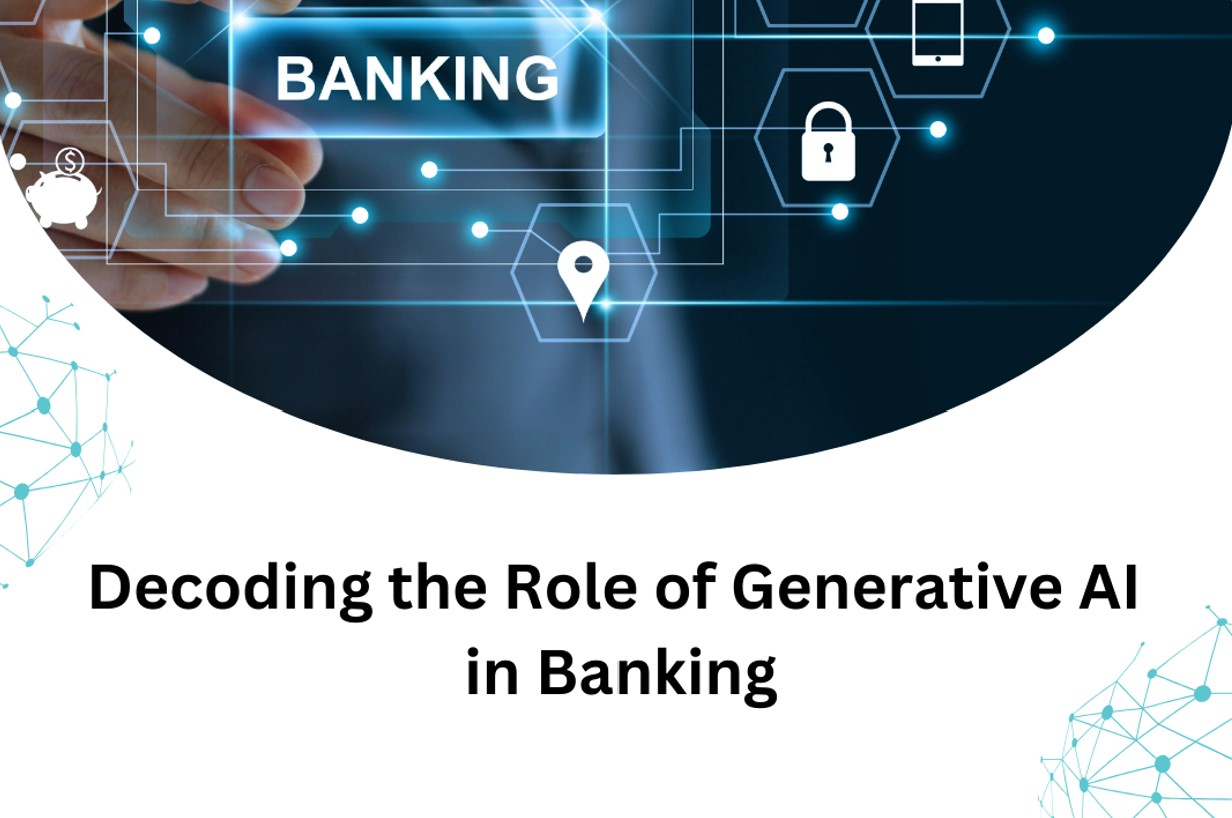Decoding the Role of Generative AI in Banking

Have you ever envisioned a bank that anticipates your needs instantly? Welcome to this new reality, powered by generative AI. But what is generative AI, and why is it significant for banks? Generative AI is a branch of artificial intelligence that can create new content, such as text, images, or even data models, based on patterns learned from vast and existing datasets. This novel technology is a game changer in the real world by aiding functionalities across almost all sectors. In the banking domain, generative AI is portraying its magic by making banking services more feasible and streamlined.
Banks are flooded with data in today's competitive environment and face intense competition. They must be swift, intelligent, and, most importantly, dedicated to customer satisfaction. Generative AI solutions are transforming the banking sector by encouraging faster decision-making. They help banks offer personalized advice and enhance security against fraud.
Banks are leveraging this technology to make banking smoother, safer, and more personalized. Ready to explore how generative AI can elevate your banking experience? Let’s go deeper into its impact and benefits.
Core Applications of Generative AI in Banking

Personalized Customer Experience
Banks are adopting generative AI to enhance customer interactions, offering a tailored banking experience each time a customer logs in. Generative AI performs like a personal banking assistant that adjusts to your preferences, needs, and future financial goals. With this technology, banks can anticipate your needs and suggest appropriate financial products without overwhelming you with options.
Risk Management
Imagine if banks could anticipate future risks with high accuracy. Generative AI makes this possible by analyzing extensive datasets to forecast potential issues such as loan defaults and significant market fluctuations. This proactive approach allows banks to safeguard their investments by identifying risks early. Plus, generative AI can scrutinize millions of transactions instantly, which eventually enhances the detection and prevention of fraudulent activities.
Automated Customer Support
Generative AI is revolutionizing customer support by managing thousands of customer interactions simultaneously. Whether it's simple inquiries like balance checks or more complex issues like transaction disputes or loan approvals, Generative AI handles them easily. This efficiency speeds up response times and improves overall bank operations. It ultimately eliminates the need for customers to wait in line for service.
Customized Investment Advice and Portfolio Management
Generative AI is a 24/7 financial advisor that analyzes your financial details alongside comprehensive market data. This integration enables it to provide personalized investment advice perfectly aligned with your financial goals. This technology transforms wealth management by offering bespoke strategies catering to individual client needs.
Generative AI’s Role in Predicting Market Trends and Advising Clients
Generative AI is an advanced tool for predicting market trends before they become mainstream news. This capability allows financial experts to provide advice that is not only intelligent but also grounded in robust data analytics. It ultimately enhances decision-making and financial outcomes for their clients.
Smarter Credit Scores with Generative AI
Generative AI is redefining credit scoring by evaluating more than just historical borrowing and payment behaviors. It incorporates many data points to build a more accurate and personalized credit profile. This method recognizes responsible financial behaviors that traditional credit scores might overlook. It eventually provides a more comprehensive assessment of an individual's creditworthiness.
Impact on Loan Approvals and Financial Inclusion
Generative AI-enhanced credit scoring enables banks to approve loans for a broader demographic. It includes those new to credit or rebuilding their credit histories. Innovations like Zest AI have reportedly increased loan approvals by 25%, extending financial opportunities to young individuals, small business owners, and historically underserved groups. This shift benefits individuals and contributes positively to broader economic growth.
Regulatory and Ethical Considerations in AI Banking
Tackling Regulatory Challenges
In the context of generative AI within the banking sector, the emphasis extends beyond the capabilities of Generative AI to include adherence to regulatory standards. Regulatory authorities are diligently updating their frameworks to match the rapid advancements in technology, ensuring fair play within the industry. Banks are obligated to comply with stringent regulations, particularly concerning the protection of customer data and financial security. Navigating these regulations is challenging due to geographical variances and frequent updates in response to emerging technologies. Banks are investing in advanced compliance tools powered by AI to manage these complexities. These tools assist in monitoring regulatory changes, enabling banks to maintain lawful operations and ensure all activities involving AI are fully compliant.
Addressing Ethical Concerns
Now, let us address the crucial issue of ethics. While AI can perform remarkable functions, concerns about privacy and fairness remain paramount. Banks are implementing rigorous measures to address these issues by training their Generative AI systems with diverse datasets. They are also conducting regular audits to ensure equitable decision-making. The goal is to build trust by ensuring that AI operates ethically and impartially, equitably serving all users.
How Banks Are Stepping Up
Banks are actively participating not only in the utilization of Generative AI but also in shaping its responsible deployment. They have established dedicated teams dedicated to AI ethics, perform regular audits, and collaborate with external oversight bodies to ensure proper governance of their AI systems. Numerous financial institutions are also forming alliances with technology experts and policymakers to promote a balanced and equitable environment for AI in banking.
Real Success Stories: How Banks Are Winning with Generative AI
Case Study 1: JPMorgan Chase: Fighting Fraud with AI
JPMorgan Chase has effectively utilized generative AI to enhance fraud detection capabilities. They implemented an advanced system that monitors real-time transactions, reducing fraudulent activities and annual savings in the millions of dollars. The AI system scrutinizes transaction patterns and swiftly flags any anomalies. It eventually provides customers with a more secure banking environment. The assurance that their financial assets are protected by cutting-edge technology offers customers greater peace of mind.
Case Study 2: Bank of America: Erica, Your Personal AI Assistant
Bank of America has revolutionized customer interaction by introducing Erica, a virtual financial assistant driven by Generative AI. Erica enables over 25 million users to manage accounts, process payments, and receive economic advice through straightforward voice or text commands. Since its introduction, Erica has dramatically enhanced customer engagement, making financial management more accessible and efficient for users.
Case Study 3: HSBC: AI for Better Investment Decisions
HSBC has elevated its wealth management services by integrating Generative AI to analyze global market trends and produce customized investment insights. This advanced approach ensures clients receive personalized advice, leading to more informed investment decisions and improved financial outcomes. The bank has observed increased customer satisfaction and higher trust as clients benefit from enhanced investment returns driven by these tailored insights.
Decoding the Role of Generative AI in Banking: A Comprehensive Wrap-Up
Generative AI is transforming the banking sector, with its impact felt across various aspects of the industry. This technology is enhancing the banking experience by offering personalized services, detecting fraud preemptively, managing risks intelligently, and responding to customer inquiries promptly. As banks strive to meet contemporary demands, generative AI ensures exceptional efficiency and robust security.
In wealth management, generative AI is significantly improving its capabilities. It provides precise financial advice and anticipates market trends to devise investment strategies previously accessible only to the wealthiest clients. Concurrently, banks are diligently addressing the challenges posed by AI. They are proactively safeguarding customer data, ensuring equitable decision-making, and maintaining transparency in their operations.
Looking ahead, the role of Generative AI Development Services in banking is set to grow even more significantly. This growth will be powered by tech advancements and the increasing demand for more personal services that are finely tuned to your needs. Banks getting into this tech are setting themselves up to lead in a constantly changing financial world.